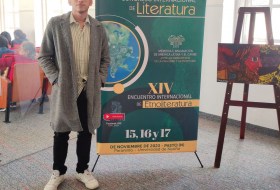News
Unicaucano student reflects on ethno-education and neglected literatures.
Juan Diego López Fernández, currently pursuing degrees in Ethnoeducation and Literature and Spanish Language, shares his work on ethnoeducation as an ethnic-political project and an educational policy stemming from social struggles and movements in the latter half of the 20th century.
The aim is to shed light on the significance of ethnoeducation through a brief historical and contextual overview to comprehend its advocacy, such as decolonization, cognitive justice, intercultural dialogue, and combating racism and cultural discrimination.
This is the proposal put forth by the student at the University of Cauca, Juan Diego López Fernández. As part of this proposal, the Unicaucano student participated in the XVIII International Literature Congress and XIV International Ethnoliterature Encounter, held from November 15th to 17th at the University of Nariño, presenting his conference titled "Etnoeducation and its valuable role in dignifying neglected literatures for a pedagogy of recognition and interculturality."
Juan Diego López Fernández proposes to position ethnoeducation as an ethnic-political project and an educational policy born out of social struggles and movements in the latter half of the 20th century, constituting a disruptive proposal in the educational and social order throughout the history of national education.
Additionally, he addresses the strong connection between ethnoeducation and neglected literatures: "Those literatures known as ethno-literature, oral literature, and others not considered relevant due to not being canonical, as they are embedded in an internal colonialism that does not transcend the Western and Eurocentric view; in this regard, this neglected literature that doesn't circulate due to academic and curricular racism is one of the reasons to understand why Colombia has been a country that hasn't taught us to recognize ourselves and acknowledge ethnic, cultural, and linguistic diversity."
Finally, he supported debates, perspectives, and proposals on "literature as a mirror" and "identification literature."
"To comprehend the task of ethnoeducation in dignifying these neglected literatures and its invitation to further disseminate these productions as an intercultural practice and recognition pedagogies, which are part of anti-racist education to acknowledge other memories, voices, and embrace other communities and identities," concluded the student.
The XVIII International Literature Congress and XIV International Ethnoliterature Encounter aim to exchange creative and research experiences to present transdisciplinary, interdisciplinary, and intercultural discussions and reflections regarding the literary and cultural diversity of Latin America and the Caribbean.


